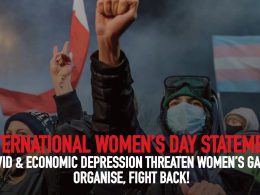By Manus Lenihan
Collins Dictionary has decided that the word of the year for 2022 is ‘permacrisis,’ because it “sums up just how truly awful 2022 has been for so many people.” This word is a paradox. A crisis usually means a painful but brief moment of tension. But in the age of permacrisis, we get all the pain and tension with no progress, no recovery, no resolution. We face a range of overlapping crises, each one feeding back into the others, such as the cost of living, climate change, war and pandemics.
Part of the meaning of ‘permacrisis’ is that the problems are so deep-rooted we can’t even understand them, let alone try to solve them. This part is not true. Obviously, we’re not going to get anywhere without the knowledge of healthcare workers or climate scientists, for example. In that sense, the problems are indeed complicated. But the biggest obstacles to fixing ‘permacrisis’ are political, not technical. They are due to the system, due to things we can change, but only if we are willing to challenge the rule of the powerful and wealthy.
So let’s start the year by breaking down permacrisis into its main aspects, the better to understand and the better to fight back.
- Climate catastrophe
There are various ways to try and deal with ‘permacrisis’ in 2023. For example, it is tempting just to ignore politics and look after your own interests as best you can. The biggest problem with that attitude is that we can’t ignore the environment, because we live in it. At least, we still do at the time of writing.
Summer 2022 was one of wild heat waves and fires. China saw widespread devastation but even in less hard-hit countries like England, firefighters reported they had never seen anything like it. Then winter saw large parts of the US unexpectedly freeze over, and just a few weeks later hundreds of weather stations across Europe announced that it was the warmest January on record (19 degrees in Poland!). Meanwhile in India temperatures have plummeted.
This is the worst example of permacrisis. In a sane world it would have been prevented decades ago. But the CEOs, billionaires and world leaders kept on burning those fossil fuels, and they continued to design cities around the car and the plane, all because it was more profitable than making the transition to cleaner energy and public transport. There were significant changes after millions of school students walked out on climate strikes in 2018 and 2019. If it were up to workers and consumers, massive progress could have been made. But it’s not up to us. The real power is in the hands of businesses and the wealthy. It is cheaper to look after their own PR through greenwashing than to actually change things.
Will big banks, industries and agri-businesses make a transition to sustainable energy in 2023? Unfortunately, not a hope. Will establishment politicians force them to? The most ambitious thing you can expect from the Irish Green Party is that they will find some new way to penalise rural people for driving. But we need truly ambitious and pro-worker measures such as free and expanded public transport, or public ownership of the energy industry.
2. Economic crisis
Another way to try and cope with the stress of ‘permacrisis’ is to fixate on some narcissistic rich guy, and have faith that he will solve all our problems with some clever invention. But it’s not easy to keep up that blind faith after 2022. Twitter, Tesla and Meta suffered disasters. NFTs and cryptocurrencies – digital fool’s gold – collapsed.
2022 was the year inflation spiralled out of control, driven by war, supply chain issues, falling productivity and profiteering. As we paid double at the fuel pump, Shell’s net income rose from $12.8 billion in 2021 to $30.1 billion in 2022. Similarly with BP, ExxonMobil, Chevron, Total, etc. Not content with destroying the planet, they are squeezing the last cents out of us.
It’s broadly accepted that we will see a global recession this year. In fact, the ruling class in the United States is flirting with recession so as to drive down wages. Various public figures have said that “there’s going to need to be increases in unemployment to contain inflation”, and described the rise in unemployment as “really terrific”, “the right direction of travel re jobs”, and “the best reason for hope”.
Why are they taking ghoulish delight in the misery of millions? Because the Covid profits surge has run out of steam, and there is a need for some new source of profit. So now big business owners are using inflation as an excuse to drive down wages.
What might a recession in 2023 mean for us? Whenever a recession comes, our jobs, pay, services and benefits are all sacrificed to ‘restore profitability,’ i.e. to maintain the rich in the manner to which they are accustomed. That’s what happened in Ireland after 2007-8, and what have we got to show for it today? Mass homelessness – 11,542 are now in emergency accommodation – and another recession around the corner.
To sum up, permacrisis in the economic sphere is not all that complicated. The messiahs of the tech sector mostly turned out to be frauds and idiots. Instead of saving the world with clever inventions, the rich are drinking toasts to unemployment and turning housing into a cash cow, which is why kids have to live in hotel rooms. It’s the simplest way to maintain profits.
3. War
Another way some people try to cope with permacrisis is by saying ‘we need to look after our own first.’ But to do that you need to exclude and attack most of the human race, including people who are in the same boat as you (or worse) when it comes to jobs, housing, services, etc. And the super-rich members of ‘your own’ remain in charge, and they only ‘look after’ themselves. So all we can ever achieve through ‘looking after our own’ is to help rich people to stay rich through divide and rule.
Capitalism was supposed to deliver peace and democracy. How many times did we hear that line? But we live in a world that’s growing more divided, violent and authoritarian. 2022 ended with a bizarre far-right coup plot in Germany and 2023 began with supporters of the far-right Bolsonaro trying to stage a coup in Brazil.
The war in Ukraine, like Covid, came as a shock to most. But it makes a twisted kind of sense in the logic of the new Cold War between the US and China. The United States, the only country with hundreds of military bases all across the world, is locked in struggle with Chinese imperialism for control of the world’s markets and resources. Likewise, Russian imperialism, which maintains an uneasy but real alliance with China, has sought to aggressively boost its influence and prestige with the brutal invasion of Ukraine. This new Cold War, of course, is a key factor in the economic problems. US politicians claim they are fighting for freedom and democracy; tell that to the Afghans and Iraqis. Russian politicians claim they are fighting for security and the national idea; tell that to the Chechens. That’s their job, as Martin Luther King said: to trick young people into being scarred or killed on ‘dark and bloody battlefields,’ all for corporate profits and imperial prestige.
Will the Ukraine war end in 2023? Probably not.
Who will win? That one is easier to answer: Northrop Grumman, Raytheon, Lockheed Martin…
The fight against imperial aggression is not a con. That is why Ukrainian soldiers have fought better than was widely expected: they are not simply fighting for the corporate interests that rule their country like every other country, nor the geopolitical goals of western imperialism. They are defending their national independence, their homes and dignity. Imperialism can be defeated not by bending the knee to some other brand of imperialism, but through the resistance of working people, and through cross-border and cross-community solidarity.
4. Pandemics
After war, we turn to another biblical horseman: plague.
While Covid thankfully recedes from the headlines in the ‘higher-income’ countries, only one in five are vaccinated in the ‘lower-income’ neo-colonial countries. The failure to vaccinate the people of China will result in disaster now with the collapse of the unsustainable Zero Covid strategy.
Here in Ireland, the hospitals have been overwhelmed by flu and respiratory infections, along with Covid, to the point where the fire service is declaring certain Emergency Departments unsafe.
As we pointed out this time last year, the pandemic was caused by three major factors (and the next pandemic will be caused by the same factors, because they haven’t been fixed): (1) the for-profit healthcare industry, which spent its billions on marketing instead of research into viruses; (2) the massive encroachment of big business into remote wilderness, shaking loose new pathogens; and (3) the underfunding of health services over decades due to privatisation and austerity.
As long as healthcare is run for profit, and nature is recklessly exploited, and public health systems are neglected, we will see more epidemics and pandemics in the future. Even before Covid we lived in a world in which diseases that previous generations had nearly wiped out were making a comeback.
We can change the world
The word ‘permacrisis’ invites pessimism. We want to live without fear of war or disease, and to hand down a better world to the next generation. This isn’t much to ask, with all the wealth and technology and know-how that exists. And yet with every passing year it’s more obvious that the powers-that-be can’t deliver on any of it, because all that wealth, tech and expertise are chasing profits instead of human welfare.
All the aspects of permacrisis feed into each other. The necessity to end each, and all, has to be seen as part of the struggle to get rid of capitalism – the system responsible for all the major crises in the world. Working-class people are the majority in society, and if united and organised we are a powerful force that can both end this system, and prevent a future of ever instensifying permacrisis. That means a struggle for fundamental, socialist change: change that will see the resources of society taken back from the big corporations, banks and the billionaires, and placed into democratic, collective ownership – from which we can plan the economy to meet the needs of all people and the planet.
The deep malaise facing the system points to the urgency of waging this struggle and winning this change. Tinkering simply won’t suffice. If you agree, join us today.












